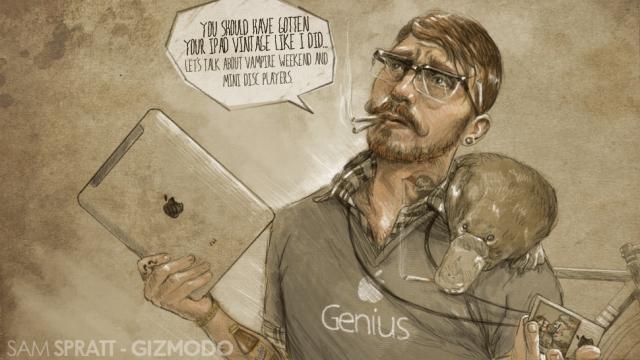What follows is a very intense trip to the Genius Bar.
1.
“For some reason, this hinge on my MacBook Air, as you can see here, isn’t closing all the way. It kind of clicks and then just stays stuck there, not quite closing. See?”
“There’s always been some error, some amount of neurological disconnect between what we’re looking at and what we think we see. The area of the brain that controls parsing visual cues essentially into reason can play some interesting tricks on us. The reward, arguably, for parsing visual cues into information or reason is emotion, isn’t it? In other words, you see something and you feel a certain way, don’t you? Which gets interesting when you look at the way emotions cue chemical relationships inside us with everything from dopamine to adrenaline, and how we have memories—of everything from falling in love, to the rush of victory, to the crushing hallow of loneliness—tied to those chemical relationships. So, in a way, we have to ask ourselves: what is the chemical and emotional reward we’re hoping to get from what we’re convinced we’re seeing? Or as two scientists from Stanford said, more poetically and assertively, ‘Reward circuits can whisper in the ear of memory circuits.’”
“So, it’s… see how the hinge, like, sticks in that one position?”
“Right, the hinge.”
“What was that other stuff you were saying?”
“Nothing. Forget it.”
– – –
2.
“Hey, how’s it going? I think there’s something wrong with the volume on my iPhone. It works fine when I listen to music, but, um, I can barely hear people when I’m on the phone with them. I’ve got Apple Care.”
“Man has been writing about the rigors of love since the dawn of time. Greek mythology, the bible, the comedies and tragedies of Shakespeare, and obviously the list goes on to include a movie you saw last month or a pop song you may have listened to today. And, very obviously, heartbreak is probably foremost on the list of things going wrong with matters of the heart. But, the thing I find interesting is that nobody seems to be asking the question: how much longing and heartbreak is absolutely manufactured by us, ourselves, as individuals, for the purpose of a predictable socialization process? The National Library of Medicine will show you thesis after thesis on adolescents and how they experience pain within the context of psychological pressures that inform the socialization process at that age. Put plainly: every sixteen year old under the sun will go through a stage where they can’t stand their parents. Why? Well, because the socialization process we’re undergoing that age is really this matter of coming up against the knowledge that we’re becoming adults; that we won’t be children forever; that we, indeed, are children no more. And what comes with this realization? Well, we understand that, at some point over the next handful of years, we are going to have to leave the nest—we’re going to have to leave our parents and get out into the world as adults and find what it holds for us. But our heart struggles with this; here are the two people who gave us life and nurtured us; here are, quite possibly, the first two people we’ve loved. We can’t imagine leaving them, so our brains start a process of differentiation; in short, we manufacture reasons, no matter how thin their premise, to hate our parents.”
“So, um, I can hear music on it, but when…”
“It’s temporary, it’s nothing serious, this disdain we have for anyone who has cared for us up to that point; if puppy love is a term that serves as a barometer for how seriously involved one’s heart might be in the concern of loving someone, then you might call this kind of adolescent hatred of parents “puppy hate.” So why haven’t we made more study of the pain people encounter in their late twenties, or in, say, middle age? There’s certainly some pretty predictable behaviour in post-adolescence. People hit their fifties, for example, turning on a dime to get divorced, falling in love madly with someone usually younger than them, and then, within a year or two, they go through another severe heartbreak when the secondary affair fails them. And, make no mistake, it almost always fails them; it’s predictable; it’s completely quantifiable. We have to ask ourselves: how much pain do we experience in our lifetime simply because we have to manufacture it in order to navigate a strait of absolutely predictable socialization for the age we’re at, no matter what our age?”
[Long pause]
“I can’t hear people on the phone. The iPod volume works fine, though.”
“Do you even have an appointment?”
– – –
3.
“My computer crashes—the whole O.S., not just the application—every time iTunes crashes. But every time I come here, I can’t get it to do it.”
“That’s weird. Let’s take a look at it here. So, when other people are around, you can’t recreate the reality that happens when you’re alone?”
“Please don’t go on a big thing about matrix mechanics and Heisenberg’s Uncertainty Principle. Please? I get it, the whole thing where the observer is not external and neutral, but through the act of observing and measuring becomes, himself, a part of observed reality. I don’t have time for a bunch of bullshit; I have to get this fixed before I travel next week.”
“Wait, what’s the principle thing you’re talking about?”
“How long have you worked here?”
McSweeney’s is an independent publisher based in San Francisco that publishes books, a quarterly fiction journal, a quarterly film DVD magazine, a monthly culture magazine, and a daily humor website. The McSweeney’s iPhone and iPad apps are available through the Apple store. For more information, visit mcsweeneys.net. More stories by Dan Kennedy can be found here.
Illustration by Contributing Illustrator Sam Spratt. Follow Sam on Twitter and become a fan of his Facebook Artist’s Page.
